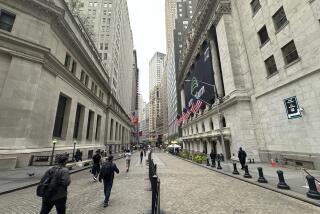Stocks Decline Broadly; Dow Tumbles 18.70
NEW YORK — Stock prices suffered a broad setback Monday in a session of wide swings, weighed down in part by worries over international debt problems.
Money center bank stocks were especially hard hit by selling following the news that Brazil had suspended interest payments on its commercial foreign debt.
The Dow Jones average of 30 industrials, down more than 30 points at mid-morning and off just a fraction after a brief afternoon recovery, closed with a loss of 18.70 at 2,216.54.
Volume on the New York Stock Exchange totaled 170.45 million shares, against 175.75 million in the previous session.
Many bankers had expected Brazil to temporarily suspend commercial debt payments, but for only 90 days at most, to ease the rapid shrinkage of its foreign reserves.
They were thus caught off guard when President Jose Sarney announced Friday night that Brazil would suspend interest payments indefinitely until lenders renegotiated its commercial debt terms.
Bank Issues Decline
In the bank group, Citicorp lost 3 3/4 to 54 1/2, Chase Manhattan fell 1 3/4 to 38 3/8, Manufacturers Hanover dropped 1 to 46 5/8, J. P. Morgan gave up 1 1/2 to 45 3/4, Chemical New York slipped 2 5/8 to 46 1/2 and Bank of Boston fell 2 1/8 to 31 3/8.
As those issues plunged in early trading, analysts said, selling spread through the rest of the market, intensified by professionals engaged in computer program trading maneuvers.
A notable exception to the market’s overall down trend was IBM, which climbed 3 3/4 to 143 3/8 with a lift from recommendations by some analysts who believe the worst of the company’s recent earnings problems are past.
Blue chips that contributed to the Dow Jones industrials’ loss included Minnesota Mining & Manufacturing, down 2 3/4 at 126 3/4; Procter & Gamble, down 1 at 85 3/4; Exxon, down 1 3/8 at 80, and Sears, Roebuck, off 1 at 51 3/4.
In the credit markets, bond prices rose in light to moderate trading, buoyed mainly by the results of the Treasury Department’s auction of short-term government securities.
In the secondary market for Treasury securities, yields on three-month Treasury bills finished 2 basis points lower at 5.56%, according to Telerate Inc. Six-month bills also fell 2 basis points, to 5.66%, and one-year bills were down 1 basis point at 5.86%.
The Treasury’s key 30-year bond rose around 3/8 point, or $3.75 per $1,000 face value, while its yield slipped to 7.53% from 7.55% late Friday. Corporate and municipal issues also gained.
In the secondary Treasury market, prices of short-term government bonds ranged from 1/32 to 1/16 point higher, intermediate maturities ranged from 1/16 to 7/32 point higher, and 20-year issues were up 7/16 point, according to Salomon Bros.
In corporate trading, industrials were up 1/8 to point and utilities were point higher in light to moderate dealings, according to Salomon Bros. Among tax-exempt municipal bonds, general obligations were up point and revenue bonds also rose point in light to moderate activity.
The federal funds rate, the interest on overnight loans between banks, finished at 6%, up from 5.875% Friday.
More to Read
Inside the business of entertainment
The Wide Shot brings you news, analysis and insights on everything from streaming wars to production — and what it all means for the future.
You may occasionally receive promotional content from the Los Angeles Times.










